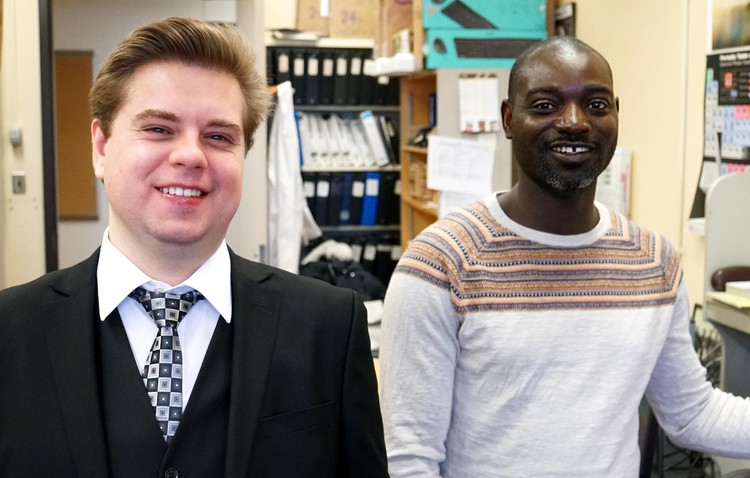They ask, machines answer
Kenneth Tam - 5 February 2018

Research Associate Anton Oliynyk and Post-Doctoral Fellow Lawrence Adutwum.
Anton Oliynyk and Lawrence Adutwum are helping researchers develop more efficient solar cells, and in the process they’re breaking down traditional barriers between scientific disciplines.
As senior HQP with Professor Arthur Mar’s research group, the two PhDs are part of a diverse team of graduate students working on the Future Energy Systems project High-throughput Materials Discovery through Materials Genomics, while also supporting other projects in the solar theme.
By applying the tools of machine learning to a discipline that had previously relied on experimentation, they are speeding the process of discovery and sharing new skills essential for success in both academia and industry.
Streamlining the discovery process
Oliynyk, Adutwum and the rest of Mar’s team use computers to analyze sets of experimental data, hoping to optimize the efficiency of existing solar cell materials, and also to identify outside-the-box alternatives.
“Chemists used to have to create large numbers of molecules for testing when they were seeking viable new materials,” Adutwum explains. “It was expensive and time-consuming –– and it was easy to miss opportunities.”
Machine learning changes the process. When Future Energy Systems solar researchers hunt for lower-cost materials that more efficiently harness the sun’s energy to create electricity or fuel, they build molecules based on what they find in the literature –– and their own experience. They then share their experimental data with Mar’s team and ask questions: what ratios between materials are most likely to improve a reaction? What similar materials might be better substitutes? Are there outside-the-box options?
After thorough analyses, Mar’s group offers these researchers a focused slate of potential materials for the next round of testing –– saving countless days in the lab and accelerating the process of discovery. By following these recommendations, one solar team has already seen reaction efficiency increase by more than 30%.
“Those improvements could have taken years of experimentation,” Oliynyk says of the still-unpublished findings. “We were able to help achieve them in just a few months.”
Asking the right questions
Anyone familiar with crime-procedural television shows could be forgiven for assuming this sort of computer analysis is fast and easy –– the equivalent of simply typing a question into a search engine. Unfortunately, that’s science fiction.
“A model can take months to run,” Oliynyk explains. “And that is only after we spend weeks figuring out the best equations for the algorithm.”
Adutwum elaborates: “When I need to know your hometown, I don’t also ask your favorite colour, your mother’s hometown, and where you like to go for vacation. Because we need different answers from every set of data, we have to create new questions each time we begin an analysis –– and make sure we don’t waste time asking ones that are not relevant.”
Both agree that finding the right questions –– or more properly, creating the correct algorithms –– for each unique set of data is a rewarding challenge, and in order to engage with a variety of data types their team depends on diverse specializations and expertise.
Fading boundaries
Neither Oliynyk nor Adutwum intended to become experts in machine learning, but plans changed when the tools were presented to them.
On leave from his teaching position at the University of Ghana, Adutwum was specializing in gas chromatography when he was introduced to chemometrics –– essentially machine learning applied to chemicals –– by University of Alberta Associate Professor James Harynuk.
Oliynyk was a PhD student working on solid materials chemistry with Professor Mar when he began searching for information about machine learning to apply to their discipline.
When the two met and began working together, they quickly realized that despite their different specializations, they truly could collaborate.
“In the past different branches of chemistry might not interact, because their daily practices and methods were so different,” Oliynyk says. “But machine learning is a method we can all share, so it lets us bring together a diverse team.”
Mar’s group has included many different kinds of science graduate students, and has even engaged undergraduate engineers. The blending of disciplines has broadened the team’s perspectives, and signals how widespread and important machine learning has become.
“Graduate students who join this group build data analysis skills that can serve them in many disciplines and industries,” Adutwum adds. “And as long as there are good computers and access to the data, people can participate from all over the world.”
Tools without borders
When he returns to his teaching position in Ghana, Adutwum hopes to continue collaborating closely with Mar’s team.
“It is a 24-hour commute each way, but I can work from home,” he smiles.
Oliynyk already has experience in being involved from afar; after finishing his PhD with Mar in 2016, he completed a Post-Doctoral Fellowship at the University of Houston –– continuing to publish with Mar and Adutwum while working on machine learning projects in the lab of Dr. Jakoah Brgoch.
When Mar joined Future Energy Systems and expanded his team, Oliynyk returned as Research Associate –– though not before experiencing the flooding of Houston after Hurricane Harvey in August 2017.
“I was on the first flight to Canada after they reopened the airport,” he laughs. “I am glad to be back at the University of Alberta.”
Being together in the same time zone makes it easier for Adutwum and Oliynyk to collaborate, but machine learning is as borderless as the data it analyzes. As the traditional boundaries between disciplines fade, Future Energy Systems researchers will continue to challenge long-established conventions in their exploration of humanity’s diverse energy future.
To learn more about High-throughput Materials Discovery through Materials Genomics, click here.
For more HQP profile stories, click here.
To subscribe for more updates, click here.